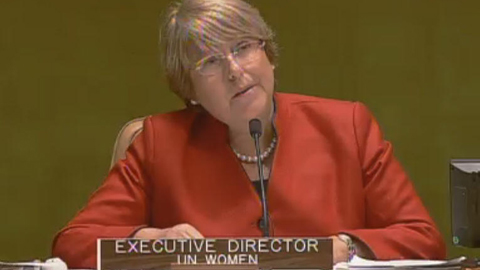Pakistan participates in the Commission on the Status of Women 2012
Date:

Rural women constitute one-fourth of the world’s population, and their contributions are vital to the well-being of communities, economies, and the achievement of all development goals. During the opening day of the Commission on the Status of Women on Monday 27 February, UN Women Executive Director Michelle Bachelet called for robust policies to remove the barriers that prevent rural women from reaching their full potential and ensure their rights.
On Tuesday, Ms. Shanaz Wazir Ali from the Office of the Prime Minister of Pakistan will participate in a panel on the economic empowerment of rural women. She will present on the issue of ensuring rural women’s access to productive resources and assets. Pakistan’s 5-member delegation is led by Fiza Batool Gilani, the country’s goodwill ambassador on women empowerment. Other members of the delegation are Bushra Zulqarnain, member of the National Commission on Status of Women, Khawar Mumtaz, member of the National Commission on the Status of Women and representative of civil society, and Saeed Ahmed Alvi, secretary of the Ministry of Human Rights.
Also from South Asia, Mr. Shishir Chandra from Men’s Action for Stopping Violence Against Women (India) will speak about changing gender stereotypes to foster a culture of gender equality.
The 56th session of the Commission on the Status of Women (CSW56) brings together in New York government officials, rural women, representatives of the United Nations and civil society, the media and the private sector. They will meet at United Nations headquarters to review progress, share experiences and good practices, analyse gaps and challenges and agree on priority actions to accelerate the implementation of the Beijing Platform for Action and the achievement of gender equality.
The Commission will focus on the empowerment of rural women and their role in poverty and hunger eradication, development and current challenges.
Rural women are key agents of change. Their leadership and participation are needed to shape responses to development challenges and recent crises.
Women are central to the development of rural areas: they account for a great proportion of the agricultural labour force, produce the majority of food grown, especially in subsistence farming, and perform most of the unpaid care work in rural areas. It is critical that their contributions be recognized and that their voices be heard in decision-making processes at all levels of governments, and within rural organizations.
Global partnerships should be scaled up to deliver on international commitments for advancing rural women’s livelihoods and rights. The 56th session of the Commission on the Status of Women is an occasion to solidify consensus among governments and civil society on urgent actions needed to make a real difference in the lives of millions of rural women.
Commitment at the international level must be followed by comprehensive action on the ground, and effective accountability mechanisms must be put into place — rural women and girls cannot wait and governments cannot fail them.
Ms. Bachelet also underlined the need to expand their economic opportunities and political participation and leadership. Highlighting the contributions of rural women and the challenges they face, UN Women events during the meeting will also showcase innovative strategies that focus on empowering rural women worldwide.